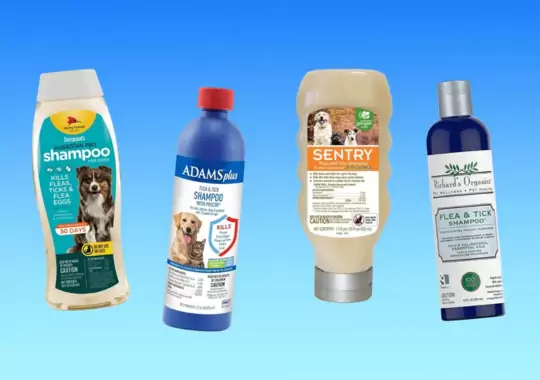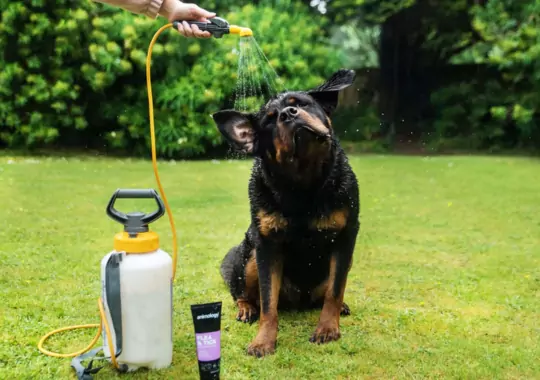As Amazon affiliates we may earn a commission if you purchase a product at no cost to you.
Tired of seeing your furry friend itching and scratching like there's no tomorrow? You're not alone! Dealing with fleas can turn your pet's life into a never-ending battle, and it's not much fun for you either. But fear not! This guide is here to help you tackle the flea problem head-on, starting with the all-important question: What shampoo do fleas absolutely despise? We'll dive into expert tips, product recommendations, and even homemade remedies to kick those pesky critters to the curb. Let's get started and bid farewell to fleas for good!
The Flea Fiasco: More Than Just a Nuisance
Fleas are more than just a tiny inconvenience. They're itchy, annoying, and can cause a host of health issues for your furry friends. They're like uninvited party crashers who refuse to leave! One major issue they bring is irritation and allergies. The incessant scratching can lead to skin irritation and even allergic reactions in sensitive pets, making them miserable and uncomfortable. Additionally, the saliva of fleas contains proteins that can trigger allergic reactions in some animals, exacerbating the problem further.
Moreover, fleas aren't just irritating; they also pose a serious health risk due to their potential for disease transmission. These pesky parasites can transmit a range of diseases to both pets and humans, including tapeworms, Bartonella (also known as cat scratch fever), and even plague in rare cases. This makes effective flea control not just a matter of comfort, but also of safeguarding the health of your entire household.

What Shampoo Fleas Detest
Commercial Flea Shampoos: The Heavy Hitters
When it comes to flea shampoos, it's a jungle out there. Some are the heavy hitters, packing a punch with strong chemicals, while others are gentle giants. It's all about finding that sweet spot. Commercial flea shampoos often contain potent insecticides like pyrethrin or permethrin, which are effective at killing fleas on contact. Look for shampoos with these active ingredients, as they are the ones that fleas absolutely despise. However, while these shampoos can be highly effective, it's essential to use them with caution, following the instructions carefully to avoid any adverse effects on your pet's skin or overall health.
Key ingredients to look for in these heavy-hitting flea shampoos include pyrethrin, a natural insecticide derived from chrysanthemum flowers, and permethrin, a synthetic chemical with similar insecticidal properties. These ingredients work by disrupting the nervous system of fleas, ultimately leading to their demise. However, it's crucial to be aware of potential side effects and risks associated with these chemicals, especially for sensitive pets or households with young children.
Natural and Homemade Solutions: The Gentle Warriors
Not a fan of chemicals? No worries! Mother Nature's got your back. There's a whole world of natural solutions that fleas find utterly repulsive. Who knew your kitchen could be a flea-fighting fortress? Natural and homemade flea shampoos often utilize ingredients like essential oils (such as lavender, peppermint, or tea tree oil), which have natural insect-repelling properties. These gentle warriors may not pack the same punch as their chemical counterparts, but they can still be effective at deterring fleas and soothing irritated skin. Just be sure to research and follow safety guidelines when using essential oils on pets, as some can be toxic if ingested or applied improperly.
Beyond Shampoo: The Full Arsenal
Combating Fleas in Your Home: Not Just a Pet Problem
Winning the war against fleas isn't just about what shampoo fleas absolutely despise. It's a full-blown strategy that involves keeping your home as uninviting as possible for these tiny invaders. Fleas don't just reside on your pet; they can infest your home, hiding in carpets, bedding, and upholstery, ready to launch another attack. To truly eradicate fleas, you need to tackle the problem at its source – your environment.
Cleaning tips are crucial in combating fleas in your home. Regular vacuuming is your first line of defense, as it helps remove flea eggs, larvae, and adults from carpets, rugs, and furniture. Be sure to focus on areas where your pet spends the most time, such as their bedding and favorite lounging spots. Additionally, washing your pet's bedding and any other fabric items they come into contact with in hot water can help kill fleas and their eggs.
Safe home remedies can also play a significant role in keeping your home flea-free. Sprinkling diatomaceous earth or baking soda on carpets and then vacuuming after a few hours can help dehydrate and kill fleas naturally. Similarly, using a mixture of vinegar and water as a household spray can repel fleas and deter them from taking up residence in your home. These natural remedies are safe for both pets and humans and can be effective in conjunction with other flea control methods.
Preventive Measures: Keeping the Critters at Bay
Prevention is better than cure, right? Regular grooming and other preventive measures can be your best defense against a flea invasion. By keeping your pet clean and well-groomed, you can spot and remove fleas before they have a chance to multiply. Bathing your pet with a flea-repellent shampoo regularly can also help keep fleas at bay and maintain their overall skin and coat health. We recommend you to check out the best flea shampoo on Amazon.
Adams Plus Flea & Tick Shampoo .
SimpleSource® Flea & Tick Shampoo.
Hartz Nature’s Shield Flea & Tick Dog Shampoo.
Vet’s Best Flea & Tick Advanced Strength Dog Shampoo .
The Last Scratch
Fleas are a pain, but with the right Plus Flea & Tick Shampoo and strategies, you can tell them to "bug off" for good. Remember, it's not just about what shampoo fleas hate; it's about creating a flea-free sanctuary for your pet and home. So, arm yourself with knowledge, and let's send those fleas packing!
Remember: Always consult with a vet before trying new products on your pet. Safety first! It's essential to prioritize your pet's well-being, and consulting with a veterinarian ensures that you're using products that are safe and effective for your furry friend. They can provide personalized recommendations based on your pet's specific needs and health status, helping you make informed decisions about flea control.
And there you have it, folks! A comprehensive, informal, and engaging guide on "What Shampoo Fleas Hate." Say goodbye to flea worries and hello to happy, healthy pets! By understanding what shampoo fleas despise and implementing effective flea control strategies, you can enjoy a flea-free environment and peace of mind knowing that your pet is protected from these pesky parasites. So, roll up your sleeves, arm yourself with the right tools, and bid farewell to fleas once and for all!
The Flea Fiasco: More Than Just a Nuisance (Cont.)
It's not all fun and games when fleas decide to set up camp. For some pets, it's an all-out allergic reaction. Flea allergy dermatitis is no joke, folks. If your furry friend is scratching like there's no tomorrow, it might be time to delve deeper.
Understanding flea allergy dermatitis is crucial for pet owners. This condition occurs when a pet develops an allergic reaction to proteins present in flea saliva. When a flea bites, it injects saliva into the skin to prevent blood clotting, and it's this saliva that triggers an allergic response in sensitive pets. The result? Intense itching, redness, inflammation, and even hair loss in severe cases. If left untreated, flea allergy dermatitis can lead to secondary skin infections and ongoing discomfort for your pet.

The Inside Scoop on Flea Shampoo Ingredients
Chemical vs. Natural Ingredients: What's In That Bottle?
Ever wonder what's actually in that flea shampoo bottle? Some ingredients sound like they belong in a science lab, not on your pet's fur! Let's decode the mystery and find out what's what.
Common chemicals used in flea shampoos include pyrethroids such as permethrin and pyrethrin, which are synthetic insecticides derived from chrysanthemum flowers. These chemicals work by disrupting the nervous system of fleas, ultimately leading to their demise. However, they can also pose risks, especially if not used correctly or if your pet has sensitivities. Other common ingredients include insect growth regulators (IGRs) like methoprene, which prevent flea eggs and larvae from developing into adults, thus breaking the flea life cycle.
On the other hand, natural alternatives offer a gentler approach to flea control. Ingredients like essential oils (such as lavender, peppermint, or citronella) are often used in natural flea shampoos for their natural insect-repelling properties. While they may not be as potent as their chemical counterparts, they can still be effective at deterring fleas and soothing irritated skin. However, it's essential to research and choose natural ingredients carefully, as some can be toxic to pets if ingested or applied in high concentrations.
Safety First: Understanding Potential Risks
Safety first, folks! Not all shampoos are created equal, especially when it comes to our younger furry friends. We'll dive into what you need to be cautious about.
Side effects to watch out for when using flea shampoos include skin irritation, redness, itching, and in severe cases, allergic reactions. It's essential to follow the instructions carefully and rinse the shampoo thoroughly to minimize the risk of adverse effects.
Recommended Article

Frequently Asked Questions FAQs
Can I use human shampoo on my pet for fleas?
Hold your horses there! Human shampoo isn't typically recommended for pets. It's formulated for human skin and can disrupt your pet's skin pH balance. Stick to pet-specific flea shampoos for safe and effective flea control.
How often should I shampoo my pet to prevent fleas?
It's a balancing act! Over-washing can dry out their skin, but not enough can invite fleas. Generally, once a month with a flea shampoo is a good rule of thumb. But hey, every pet is unique, so adjust as needed.
Are flea shampoos safe for all pets?
Well, it's a bit like asking if peanut butter is safe for everyone. Most pets, sure, but there are exceptions. Some ingredients might not be suitable for puppies, kittens, or pets with certain health conditions. When in doubt, ask your vet!
Conclusion
In conclusion, combating fleas is akin to a delicate dance – at times, you take the lead, and at others, you follow their tricky steps. However, armed with the shampoo that fleas absolutely despise, coupled with proactive preventive measures and a generous dose of patience, you'll soon have your pet grooving to the flea-free boogie! So, dear readers, armed with our comprehensive guide on "What Shampoo Fleas Hate," let's toast to the prospect of joyous, itch-free pets and a home blissfully devoid of those pesky critters. Here's to a future filled with happy, healthy companions and a sanctuary free from flea-related woes!










